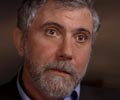Charles Duhigg The New York Times

They pushed Fannie and Freddie into conservatorship, which is what this law that Congress had passed allowed. What it means is that Fannie and Freddie are effectively controlled by the government. They're still independent companies. They're not pushed into the equivalent of bankruptcy; there's still stock in them. But the boards and the CEOs of both companies are forced out. They can't do anything essentially without the government's permission. New CEOs and new boards are brought in, and those people are chosen by the government. … In addition, each company has access to $100 billion if they need to raise money.
This is the bazooka?
This was the bazooka, right. By getting the bazooka Paulson made it inevitable that he would have to use it. And a lot of people were very critical of Paulson on this. …
There's this argument out there -- and it's impossible to know whether it's true -- that basically says if the government hadn't forced Fannie and Freddie to get taken over, … that Lehman would have been able to strike a deal and get enough capital to survive and avoid bankruptcy because there would have been enough confidence that whatever they've got on their books could be managed through. But that when the government took over Fannie and Freddie, it sent a signal that these loans are just too toxic that are out there. And that's why nobody would touch Lehman without a government guarantee.
Adam Davidson NPR/Planet Money
... And then Sept. 6, I guess, Fannie Mae and Freddie Mac needed a rescue. That was the first thing that you saw. If Fannie Mae and Freddie Mac hadn't been saved, I remember one guy, a former Treasury official, saying to me explicitly, "Global capitalism would have ended; it would have ceased," because Fannie Mae and Freddie Mac represent something like $5 trillion of bonds that undergird a huge portion of the global financial system. They're seen as almost as safe as U.S. Treasuries, almost the same as a U.S. Treasury [bill]. And you would have just seen a complete seizing up of capital markets.
Martin Feldstein Economist, Harvard University
I think it was a necessity. These were government entities. They were a strange, inappropriate hybrid of a government lending institution and a privately owned -- that is, shareholder-owned -- company. So between the two of them, they had $5 trillion of either outright liabilities, bonds or guarantees, which the federal government was guaranteeing, and yet they were out there to make profits for their shareholders. Quite unusual -- nothing like it elsewhere in the economy. Their purpose on paper was to facilitate lower interest rates and the spread of mortgage availability to low-income individuals, but because there were no creditors watching, of course, why would you care what risks they were taking if you had a U.S. government guarantee? They were able to take outrageous risks, and that's what we saw happen.
And they contributed to the problem in a sort of big and fundamental way.
They did, yes.
Barney Frank Chair, House Financial Services Committee (D-Mass.)
Let's talk a little bit about Freddie and Fannie and the conservatorship. An appropriate step, a necessary step?
Probably. I think the answer is at the time that it was necessary for Freddie, maybe not necessary for Fannie. But given the way the markets work, if you had done it for Freddie and not Fannie, then it would have been necessary for Fannie. They now have been arguing that Fannie had overestimated some of its returns, so I think it was a good thing for both of them, because as a result of the conservatorship -- which, by the way, grew out of legislation we passed and enabled them to do, and it was part of the good cooperation with Paulson -- Fannie and Freddie are now being useful instruments in terms of trying to help with the mortgage crisis.
First of all, Fannie and Freddie are the holders of some of these subprime mortgages or mortgages just above subprime, and they are taking some actions to reduce foreclosures. Secondly, they are going to be making money available to bring down rates in the future. So the conservatorship of Fannie and Freddie preserved their ability to be very useful in this crisis.
Mark Gertler Economist, New York University
That was the Treasury that took the lead in taking over Fannie and Freddie. Most of these problems we know now were buried in the mortgage market really beneath the surface, and everybody missed it. The rating agencies missed it, everybody. ...
And it goes back to the Great Depression that in a financial crisis, one thing you do is the government takes control of the mortgage market. That's what happened in the Great Depression. It happened much later on than in this crisis. So that seemed like a natural step to do, and I think there was hope that that would do it. ... The difference now is the financial instruments look quite a bit different.
Like what?
Securitized mortgages.
What's a securitized mortgage?
In the past, financial institutions like a bank would initiate a mortgage and hold it on its balance sheet. In the securitized world, an institution will initiate a mortgage and then package it with other securities, and sell it off so any other financial institution can hold it.
And maybe the biggest problem underlying this crisis is, standards were lowered on the type of mortgages that could be initiated. They were sold off and securitized. They were given the stamp of approval by the credit rating agencies, who, along with everybody else, grossly underestimated the risk. They underestimated the default risk, I think in part because there were lots of shady practices in subprime lending, so you could get people who met the official characteristics to qualify [for] the loan, but if you had dug deeper, they really weren't qualified.
Also -- and looking back, this is the most numbing aspect -- there were no provisions to renegotiate these loans if the borrower got in trouble. In other words, if the borrower is dealing with a bank, the borrower is in trouble, you renegotiate. With a securitized mortgage, the way they were set up, this was not possible.
So what that meant is that the only option was foreclosure. Foreclosure meant the home was put on the market. All these homes on the market from foreclosure drove down housing prices, making the problem worse. And we're still stuck in that situation today. We can't figure out a way to deal with these foreclosures just because of the way the institutions were set up. And I don't know of anybody who saw this. There were people who predicted crises; I don't know of many people who saw this coming. ...
Paul Krugman The New York Times
Fannie Mae/Freddie Mac -- it's funny. I don't think of that in terms of the crisis management as being an epochal event. We knew there were problems there. As a share of assets, the losses were not all that big. But these were very thinly capitalized, and they were able to be thinly capitalized because implicitly they were wards of the U.S. government. And implicit turned explicit, and no really big deal, I think, actually.
It was the period of uncertainty when people were not sure, maybe the government really would let them go under, that temporarily did a lot of damage to the mortgage market. But then what everybody expected would happen did happen, and that was OK. ...





